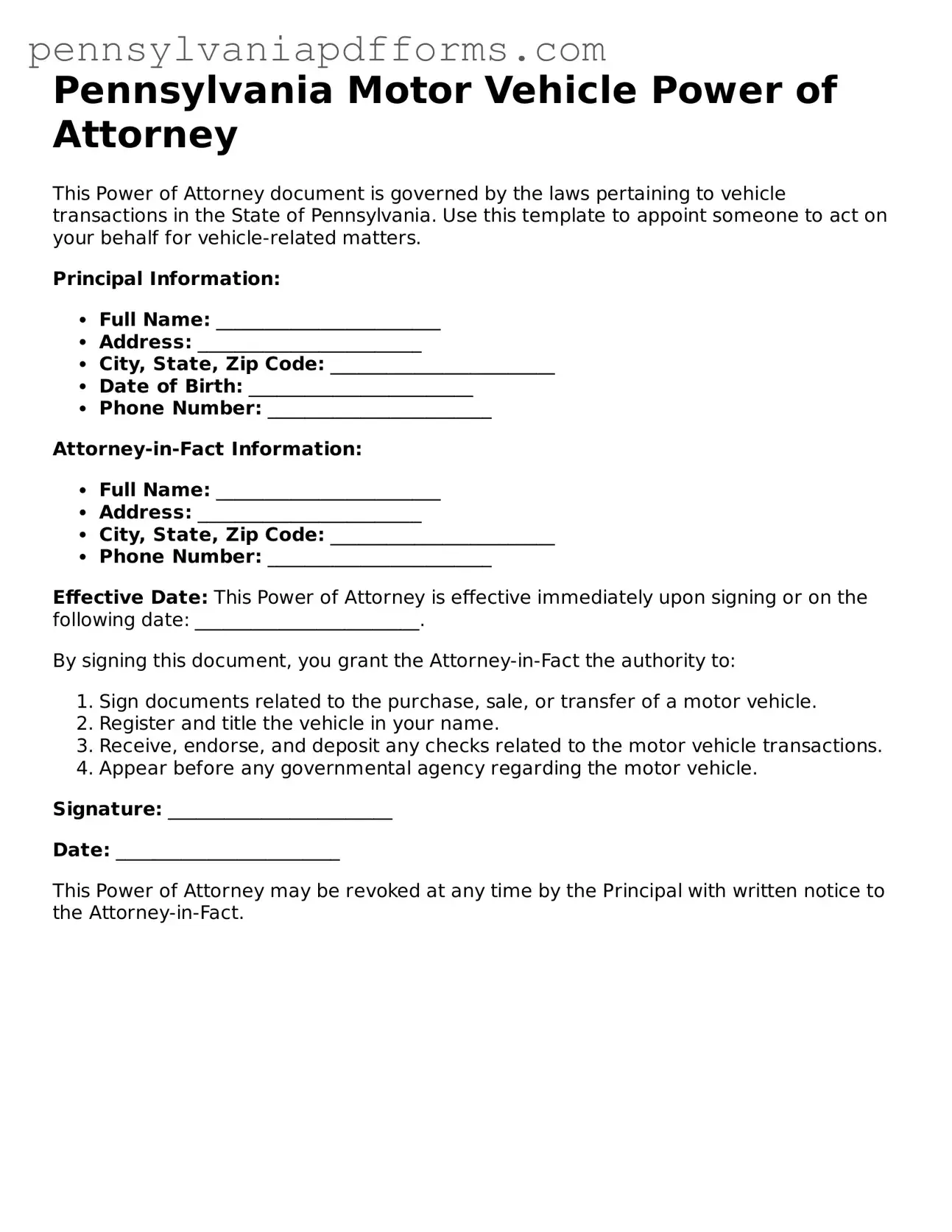The Durable Power of Attorney is a legal document that allows one person to appoint another to manage their financial and legal affairs. Similar to the Pennsylvania Motor Vehicle Power of Attorney, this document remains effective even if the person who created it becomes incapacitated. Both documents grant authority to act on behalf of another individual, ensuring that their interests are represented in specific matters, such as vehicle transactions in the case of the motor vehicle form.
The Limited Power of Attorney is another document that shares similarities with the Pennsylvania Motor Vehicle Power of Attorney. This type of power of attorney grants authority for a specific task or for a limited period. For instance, while the motor vehicle form focuses on vehicle-related transactions, a limited power of attorney may allow someone to handle real estate transactions or manage a bank account. Both documents delineate the scope of authority granted to the agent.
A Medical Power of Attorney allows an individual to appoint someone to make healthcare decisions on their behalf. While this document focuses on medical matters, it shares the same fundamental principle as the Pennsylvania Motor Vehicle Power of Attorney: granting authority to another person. Both documents require clear designation of the agent and the specific powers being granted, ensuring that the individual's wishes are respected.
The General Power of Attorney provides broader authority than the motor vehicle form. It allows an agent to handle a wide range of financial and legal matters, from managing bank accounts to selling property. While the Pennsylvania Motor Vehicle Power of Attorney is limited to vehicle-related transactions, both documents require the principal's consent and must be executed in accordance with state laws.
The Healthcare Proxy is similar to the Medical Power of Attorney but focuses specifically on healthcare decisions. Like the Pennsylvania Motor Vehicle Power of Attorney, it designates someone to act on behalf of another person. Both documents emphasize the importance of having a trusted individual make decisions when the principal is unable to do so, ensuring that their preferences are honored.
The Ohio Motor Vehicle Bill of Sale form is crucial for ensuring the proper transfer of vehicle ownership, clearly defining the roles of buyer and seller. For additional resources and assistance in completing this necessary document, you can visit the PDF Document Service, which provides valuable templates and guidance.
The Living Will is a document that outlines an individual's wishes regarding medical treatment in situations where they cannot communicate their preferences. While it does not grant authority to another person, it complements the Medical Power of Attorney and Healthcare Proxy. Both documents work together to ensure that an individual’s healthcare preferences are respected, similar to how the motor vehicle form ensures that vehicle-related decisions are made according to the principal's wishes.
The Revocation of Power of Attorney form allows an individual to cancel a previously granted power of attorney. This document is important for maintaining control over who has authority to act on one’s behalf. Similar to the Pennsylvania Motor Vehicle Power of Attorney, it must be executed properly to be valid. Both documents require clear communication of the principal's intentions and must be documented to prevent misunderstandings.
The Affidavit of Heirship is a document used to establish the heirs of a deceased person, particularly when no will exists. While it serves a different purpose than the Pennsylvania Motor Vehicle Power of Attorney, both documents involve the transfer of authority or rights. The affidavit can help in transferring ownership of a vehicle after someone passes away, similar to how the motor vehicle form facilitates the transfer of vehicle ownership during the principal's lifetime.
The Bill of Sale is a document that records the sale of an item, such as a vehicle. While it is not a power of attorney, it is often used in conjunction with the Pennsylvania Motor Vehicle Power of Attorney when a vehicle is sold. Both documents are crucial for ensuring that the transaction is legally binding and that the rights of both the seller and buyer are protected.
The Title Transfer form is another document that is closely related to the Pennsylvania Motor Vehicle Power of Attorney. This form is used to transfer ownership of a vehicle from one person to another. When the motor vehicle power of attorney is executed, it often accompanies the title transfer to ensure that the designated agent can legally complete the transaction. Both documents play a critical role in the process of vehicle ownership transfer.

